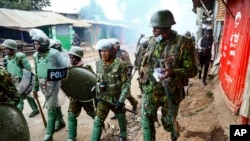The High Court said Friday it has ordered that the lawsuit be served to top government officials and that the case be heard on June 12.
Responding to Haiti's appeal for assistance, Kenya offered last July to send 1,000 officers to help tackle a worsening security crisis.
However, Kenya's High Court ruled in January that the police officers could not be deployed to Haiti in the absence of a "reciprocal arrangement" with the host government.
Kenyan President William Ruto then signed a security deal with Haiti's then-prime minister Ariel Henry in March, which Nairobi hoped would satisfy the court's objections and allow the deployment to go ahead.
Lawyers Ekuru Aukot and Miruru Waweru, who lead an opposition party in Kenya called Thirdway Alliance, said in their application to the High Court on Thursday that respondents – including Ruto and the police – had blatantly disobeyed the court order in signing the reciprocal instrument with Haiti.
They said the government would be in contempt of court if it pressed ahead with the deployment.
"The applicants are reliably informed that the impugned deployment may be done any time from now," the lawyers said in their application.
Ruto's spokesperson did not immediately respond to a request for comment.
Kenya's government said in March it was pausing the deployment following Henry's resignation. But Ruto said later that the swearing-in of a transition council in Haiti on April 25 had addressed concerns about a power vacuum there and that Kenya was now discussing how to proceed with its deployment.
Last week, the U.S. military's Southern Command said civilian contractors had arrived in Haiti to build living quarters for the Kenyan-led force.
Jamaica, the Bahamas, Barbados, Benin, Chad and Bangladesh have also pledged personnel to the force.
Foreign governments have been reluctant to take part in the mission. Many Haitians have also been wary of international interventions after previous U.N. missions left behind a devastating cholera epidemic and sex abuse scandals.








Forum